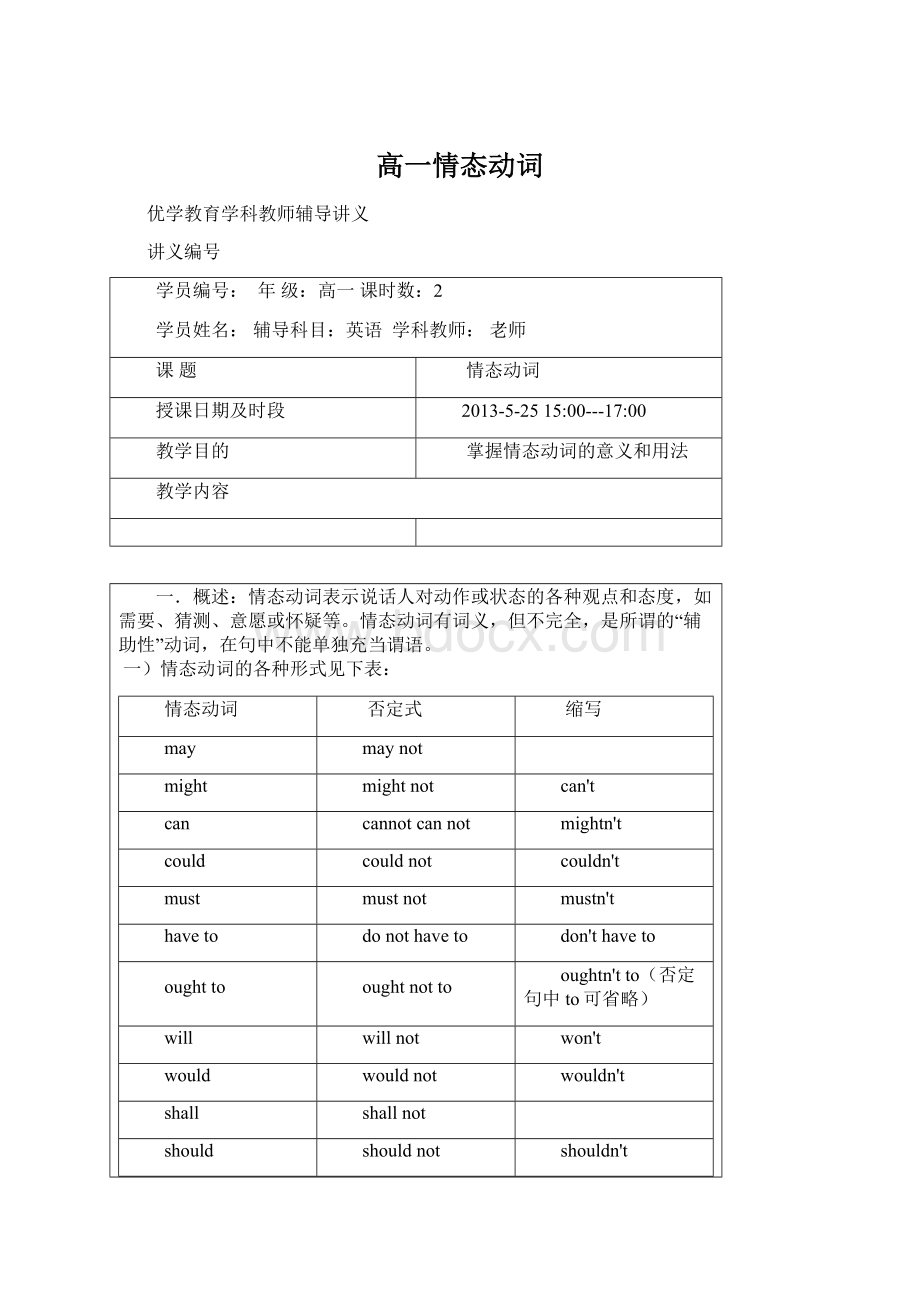高一情态动词.docx
《高一情态动词.docx》由会员分享,可在线阅读,更多相关《高一情态动词.docx(21页珍藏版)》请在冰豆网上搜索。

高一情态动词
优学教育学科教师辅导讲义
讲义编号
学员编号:
年级:
高一课时数:
2
学员姓名:
辅导科目:
英语学科教师:
老师
课题
情态动词
授课日期及时段
2013-5-2515:
00---17:
00
教学目的
掌握情态动词的意义和用法
教学内容
一.概述:
情态动词表示说话人对动作或状态的各种观点和态度,如需要、猜测、意愿或怀疑等。
情态动词有词义,但不完全,是所谓的“辅助性”动词,在句中不能单独充当谓语。
一)情态动词的各种形式见下表:
情态动词
否定式
缩写
may
maynot
might
mightnot
can't
can
cannotcannot
mightn't
could
couldnot
couldn't
must
mustnot
mustn't
haveto
donothaveto
don'thaveto
oughtto
oughtnotto
oughtn'tto(否定句中to可省略)
will
willnot
won't
would
wouldnot
wouldn't
shall
shallnot
should
shouldnot
shouldn't
need
neednot
needn't
dare
darenot
daren't
usedto
usednotto/didnotuseto
Usedn'ttodidn'tuseto
二)情态动词的语法特征
1)情态动词不能表示正在发生或已经发生的事情,只表示期待或估计某事的发生。
2)情态动词除ought和have外,后面只能接不带to的不定式。
3)情态动词没有人称,数的变化,即情态动词第三人称单数不加-s。
Yououghttoweararaincoat.
Sheoughttoweararaincoat.
Plantsmusthaveoxygeninordertolive.
Aplantmusthaveoxygeninordertolive.
4)情态动词没有非谓语形式,即没有不定式,分词,等形式。
三).情态动词表示推测的用法:
除oughtto,usedto等外,后面只接不带to的不定式。
can,could,may,might,must皆可表示推测,其用法如下:
1)情态动词+动词原形。
情态动词+do
表示对现在或将来的情况的推测,此时动词通常为系动词。
Youshouldn'tbesocareless.
Jessicatoldhimyesterdayshemightnotgoonthetrip.
Difficultiescanandmustbeovercome.
Idon'tknowwheresheis,shemaybeinWuhan.
2)情态动词+动词现在进行时。
情态动词+bedoing
表示对现在或将来正在进行的情况进行推测。
Shemustbelisteningtopopmusic.
Youshouldbereviewingyourlessons.
Mymothermaybecookingnow.
Atthismoment,ourteachermustbecorrectingourexampapers.
3)情态动词+动词完成时。
情态动词+havedone
表示对过去情况的推测。
TheymighthavevisitedtheGreatWall.
Hemusthavegotupveryearlytocatchthetrain.
Yououghttohavecomeearlier.
Theroadiswet.Itmusthaverainedlastnight.
4)情态动词+动词的现在完成进行时。
表示对过去正在发生事情的推测。
Yourmothermusthavebeenlookingforyou.你妈妈一定一直在找你。
5)推测的否定形式,疑问形式用can't,couldn't表示。
Mikecan'thavefoundhiscar,forhecametoworkbybusthismorning.
注意:
could,might表示推测时不表示时态,其推测的程度不如can,may。
6)情态动词+bedone
Thiswordcanalsobeusedasaverb.
Somethingmustbedonetostoppollution.
Theworkoughttohavebeenfinishedlongago.
5.情态动词的时态并不是区分时间的主要标志。
在一些场合中,情态动词的现在式和过去式都可以表示现在时间、过去时间或将来时间。
I'mafraiditmightraintonight.
CouldIborrowyourbooks?
It'sanicedaytoday.Wecouldgoforawalk.
6.情态动词是互相排斥的,一般不允许两个意义相近的情态动词连用。
【误】Soldiersmusthavetoobeyorders.
【正】Soldiershavetoobeyorders.
【正】Soldiersmustobeyorders.
【误】CanIbeabletoborrowtwobooksatatime
【正】CanIborrowtwobooksatatime
【正】WillIbeabletoborrowtwobooksatatime
四)情态动词的意义和用法
A.may和might
1.表示请求、许可,常译为“可以”。
在口语中可用can,could代替may,但在正式场合用may。
表示允许时,也可用might代替,might不表示过去时,而是表示口气比较婉转。
Youmaytakethisseatifyoulike.May/Can/Could/MightIhaveatalkwithyou
---May/MightIcomeintotheroomtoseemymother
---No,youmustn't.Sheneedstohaveagoodrest.
提示:
MayI...问句常见的肯定回答和否定回答。
肯定回答
Yes,please.Certainly.Yes,ofcourse.Sure.Goahead,please.
否定回答
No,youcan't.(最常见)No,youmustn't.(具有强烈禁止的意思)
Pleasedon't.You'dbetternot.Idon'tthinkyoucan.I'msorryit'snotallowed.
2.表示推测,可译为“可能,也许”。
Yourmathteachermay/mightbeinhisoffice.
你们的数学老师可能在办公室里。
(一般情况下,might表示的可能性很小)
Thelightisn'ton.Itmay/mightbebroken.
Theremay/mightbesomeinkleftinthebottle.
注意:
用may表示推测一般不用于疑问句,在疑问句中通常用can来代替。
Canhebeathome他可能在家吗?
---Canitbetrue这可能是真的吗?
---Itmaybe,ormaynotbe.可能是,也可能不是。
3.有时可以用于祈使句表示祝愿。
Mayyousucceed.祝你成功
Mayyoubehappy.祝你快乐。
Maythatdaycomesoon.希望这一天早日到来。
4.比较may和might
1)表示允许或请求;表示没有把握的推测;may放在句首,表示祝愿。
MayGodblessyou!
Hemightbeathome.
注意:
might表示推测时,不表示时态。
只是可能性比may小。
2)成语:
may/mightaswell,后面接不带to的不定式,意为"不妨"。
Ifthatisthecase,wemayaswelltry.
典型例题
Peter___comewithustonight,butheisn'tverysureyet.
A.must B.may C.can D.will
答案B.表可能性只能用may. 此句意可从后半句推出。
B.can和could
1.表示能力,可译为“能,会”。
Icanswim.
Emilycandancewellandhermothercoulddancewellwhenshewasyoung.
Thecinemacanseat1,000people.
IcouldnotreadsuchaneasybookwhenIwas7yearsold.
2.表示允许、许可,常用在口语中。
could比can语气上要客气。
---CouldIuseyourdictionary我可以用一下你的字典吗?
---Yes,goahead.可以,用吧。
(或Yes,youcan.但不能说Yes,youcould.)
Could/Canyoutellmehowtogettothezoo
Heaskedmewhetherhecouldtakethebookoutofthereadingroom.
3.表示推测,可用于肯定句(can罕见)、否定句和疑问句,但更常见于疑问句或否定句。
在此种用法中can和could没有时态的区别,只是表示可能性的大小,can表示推测的可能性比could大。
Canhebeillathome
Canthestorybetrue
Hecannotbeathome.。
Youmustn'tsmokewhileyouarewalkingaroundinthewoods.Youcouldstartafire.
4.表示惊异、怀疑、不相信等态度,主要用于否定句和疑问句中。
Howcanyoubesocareless你怎么这么粗心?
Wherecancouldtheyhavegone他们会去了哪里?
Hecan't/couldn'tbeoversixty.他不可能超过60岁。
5.Could可以用在虚拟条件句中。
IfIcouldfly,Ishouldbeveryhappy.如果我能飞,我会很高兴。
Ifyouhadfollowedmyadvice,youcouldhavefinishedit.如果你当时听我的,你早就做完了。
Ifyouhadtriedharder,youcouldhavepassedyourexam.如果你再努力些,你就能通过考试了。
6.can与beableto的区别
①can表示“能力”时,和beableto相当,许多场合都可以互相替换。
但当叙述过去经过一番努力才能完成的事情或前面有特殊说明,表示你有能力时,只能用beableto。
【正】Canyouspeakanyforeignlanguages你会说外语吗?
【正】Areyouabletospeakanyforeignlanguages你会说外语吗?
【误】Thefirespreadthebuildingquicklybuteverybodycouldescape.
【正】Thefirespreadthebuildingquicklybuteverybodywasabletoescape.
大火迅速蔓延到整幢大楼,但大家都逃了出来。
【正】Thefirespreadthebuildingquicklybuteverybodymanagedtoescape.
大火迅速蔓延到整幢大楼,但大家都想法逃了出来。
②beableto比can有更多形式。
Noonecouldanswerthequestion.
没人能回答这个问题。
(这里could可用wasableto代替)
Whenhegrowsup,hewillbeabletosupporthisfamily.他长大后就能养家了。
Frankisill.Hehasn'tbeenabletogotoschoolforoneweek.
I'msorryfornotbeingabletohelpyouintime.对不起,不能及时帮你的忙。
③could经常和动词see,hear,smell,taste,feel,remember,understand等连用。
Whenwewentintothehouse,wecouldsmellsomethingburning.
当我们走进屋子时,我们闻到什么东西烧焦了。
(不用wasableto)
Shespokeinaverylowvoice,butIcouldunderstandwhatshesaid.
虽然她讲话的声音很低,但我还是明白了她说的话。
④在谈论说话时发生的动作,用can,不用beableto。
【误】Look!
I'mabletoswim.
【正】Look!
Icanswim.看,我会游泳了!
C.must和haveto
1.must表示有做某一动作的必要或义务,强调主观看法,可译为“必须,应该”。
Everyonemustobeytherule.Wemustdoeverythingstepbystep.
Teachersmustbepatientenoughwiththeirstudents.
2.haveto表示因客观需要促使主语不得不做某事。
Youcan'tturnrighthere.Youhavetoturnleft.
Myeyesightisverypoor.Ihavetowearglassesforreading.
Youhavetopassatestbeforeyoucangetadrivinglicence.
3.must与haveto的比较。
1)两词都是'必须'的意思,must含有说话者的强烈决意(表示主观的看法),
haveto则表示外力环境或习惯使然(即表示客观的必要,作“不得不”解)。
Mybrotherwasveryill,soIhadtocallthedoctorinthemiddleofthenight.
我弟弟病得很厉害,我只得半夜里把医生请来。
(客观上需要做这件事)
Hesaidthattheymustworkhard.他说他们必须努力工作。
(主观上要做这件事)
Imuststudyhard.我必须努力学习。
(发自内心的决定)
Ihavetostudyhard.我不得不努力学习。
(外界因素逼迫)
2) haveto有人称、数、时态的变化,而must只有一种形式。
但must可用于间接引语中表示过去的必要或义务。
Hehadtolookafterhissisteryesterday.
3)在否定结构中:
don'thaveto 表示"不必"
mustn't 表示"禁止",
Youmustkeepitasecret.Youmustn'ttellanyone.你必须保密,你不可以告诉任何人。
(mustn't表示“禁止”)
Youdon'thavetotellmethesecret.你不必告诉我这个秘密。
(don'thaveto意思是“没有必要”=don'tneedto)
Youdon'thavetotellhimaboutit. Youmustn'ttellhimaboutit.
4.must用于表示推测,它的肯定程度比may,might,could大得多,一般只用于肯定句。
①mustdo(这里的do通常是状态动词或系动词),表示对现在状态的推测。
Hemustbeverylazyforhisdeskisveryuntidy.他肯定很懒,因为他的课桌很不整洁。
Carolmustgetveryboredwithherjob.Shedoesthesamethingeveryday.
②mustbedoing表示对现在动作或状态的推测。
Putonmoreclothes.Youmustbefeelingcoldwithonlyashirton.
③musthavedone表示对过去的动作或状态的推测。
Thegroundiswet.Itmusthaverainedlastnight.地面是湿的,昨晚肯定下雨了。
Ididn'thearthephone.Imusthavebeenasleep.我没听见电话铃响,我一定是睡着了。
提示:
must表示推测只用于肯定句,否定句和疑问句要用can,could来代替must。
He'sjusthadhislunch.Hecan'tbehungryalready.他刚吃过午饭,不会饿的。
Theyhavejustarrivedhere.Theycan'tknowmanypeople.
Lesliewalkedpastmewithoutspeaking.Hecan't/couldn'thaveseenme.
莱斯利从我身边走过而没打招呼,他肯定没看见我。
5.must可用来表示根据逻辑推理必然要发生的事,可译为“必然会,总是会”。
Weallmustdie.我们都会死。
Truthmustbeout.真相必然会大白的。
Wintermustbefollowedbyspring.冬天到了,春天还会远吗?
D.will和would
1.will和would可用于第二人称疑问句,表示请求和建议等。
would比will委婉客气。
Willyouhavesometea你喝点茶,好吗?
Willyoushareyourhappinesswithus你可以把你的欢乐与我们共享吗?
Wouldyoupassthisbooktothestudentinthelastrow
注意:
Will/Wouldyou...表示请求和建议的答复。
肯定回答
Yes,please.是的,请。
Certainly.当然可以。
Sure.当然了。
Allright.好啊!
否定回答
I'msorry.Ican't.No,thankyou.No,Iwon't.不,不行。
2.will和would可表示意志、愿望和决心,用于各种人称陈述句。
Iwilldoanythingforyou.
Iwillnevertellyouthesecret.
Theywouldnotlethiminbecausehewaspoorlydressed.
3.will和would可表示某种倾向或习惯性动作。
will表示现在的习惯动作,would表示过去的习惯动作。
HewillsurftheInterneteverynight.
Theboywillsittherehourafterhourlookingatthetrafficgoby.
那男孩常常坐在那儿好几个钟头,看着车辆行人通过。
Hewouldbenervouswhenhemetstrangers.
Inclasshewouldasksomesillyquestions,andhisclassmateswouldlaughathim.
课上,他总是问一些蠢问题,他的同学们总是嘲笑他。
4.will可表示固执坚持,这时will不可使用'll的简略形式。
用于非人称主语时,表示物体的固有性质和倾向。
Iwilltakethejob,andnoonecanstopme.
Hewon'tdowhathe'stold.他就是不愿按所吩咐的去做。
Thewindowwon'topen.。
Thisglasswillnotcrackunderheavypressure.
5.will表示将来时间时,不可用于条件状语从句,但will表示意愿或决心时,可用于条件状语从句。
Ifyouwillreadthebook,I'lllendittoyou.如果你愿意读这本书,我会把它借给你。
Ifyouwillgiveupsmoking,yourhealthwillimprove.如果你愿意把烟戒掉的话,你的健康状况就会好转。
6.will和would可表示推论或猜测。
Thepatienttookthesleepingpillsanhourago.Hewillbeasleepnow.病人一小时前吃的安眠药,现在应该睡着了。
Itwouldbeabouttenwhenhelefthome.Ithoughthewouldh